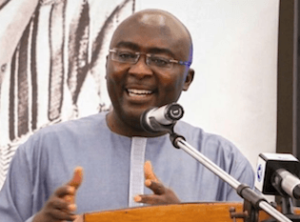Centralised National Data Base to roll out soon – Vice President
 The Vice President, Dr Mahamudu Bawumia, says all is set for the implementation of a digital addressing system to record state properties and citizen’s data in a centralised national database.
The Vice President, Dr Mahamudu Bawumia, says all is set for the implementation of a digital addressing system to record state properties and citizen’s data in a centralised national database.This, together with the National Identification System, would be a building block to properly formalise the economy to aid national planning and economic development, he said.
Vice President Bawumia, who was the Special Guest of Honour at the 87th Speech and Prize-giving Day of the St. Augustine’s College in Cape Coast,
said major stakeholder consultations had been done and a technical team had also been constituted for the project to commence in July, this year.
He said the project, expected to be completed before the end of the year, would ensure a unique addressing system and national identification for the country.
Vice President Bawumia said these were major prerequisites for economic development as many economies could not function effectively without them.
“Our economy right now is extremely informal so people can hide in this economy. People generally do what the system allows them to do and if you want ethical behaviour, you have to design systems that actually encourage that ethical behavior, so we are in a process of doing just that,” he said.
The Speech and Prize-Giving Day was on the theme: “Raising Ethical Leaders for Nation Building: The Pivotal Role of Students” and it brought together people from all walks of lives including eminent old boys and distinguished personalities.
The Vice President expressed optimism that when the economy was formalised in such a way that every citizen was uniquely identified, it would enormously benefit the present generation and generations to come.
“An economy which is not formalised only encourages unethical and criminal behaviour. People could do a lot of deviant things and may not be punished for it. The digital addressing system will make it difficult for people to invade tax,” he said.
The vice President Bawumia said government would soon come out with firm policies to stamp out the destruction of water bodies through illegal mining activities.
Making a statement on job creation, the Vice President said government was introducing the National Entrepreneurship and Renovation Plan designed to enhance the emergence and growth of businesses through financial and innovate business support.
This, he said, would provide the Ghanaian youth with the entrepreneurial skills as an alternative to salaried employment and help young people to start new businesses to be competitive nationally and internationally.
He expressed worry about the abandonment of numerous government properties which were at various stages of completion across the country.
To address this, he said, government would set up a National Assets Protection Programme to be operated by the Ghana Infrastructure Investment Programme to identify, locate and value all uncompleted government assets for completion.
Professor Francis Ofei, the Dean of School of Medical Science, University of Cape Coast, who was the Guest Speaker, said Ghana needed to make some compromises to involve the youth in key national issues in order to have the desired leaders.
He said there was the need for the country to make conscious efforts to build confidence in the youth and help them to adhere to ethical practices.
Prof. Ofei said it was time the nation started focusing on correctional activities rather than the get-tough approach that relied on punishment as research had shown that such approaches often dampened the confidence and spirits of students.
Source: GNA
